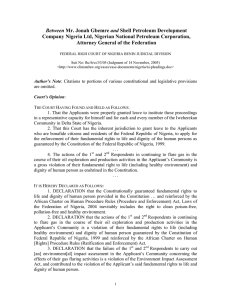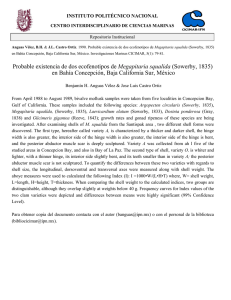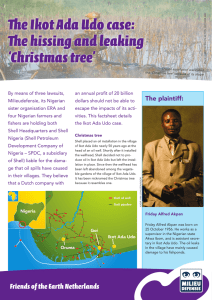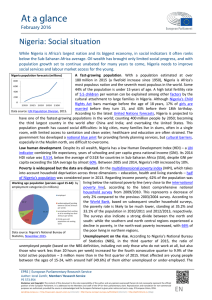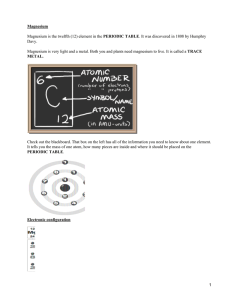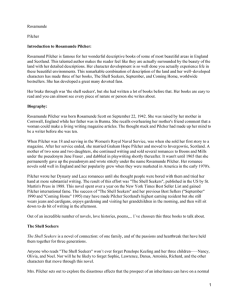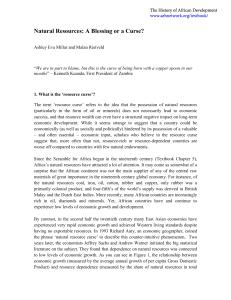Factsheet Broken promises
Anuncio
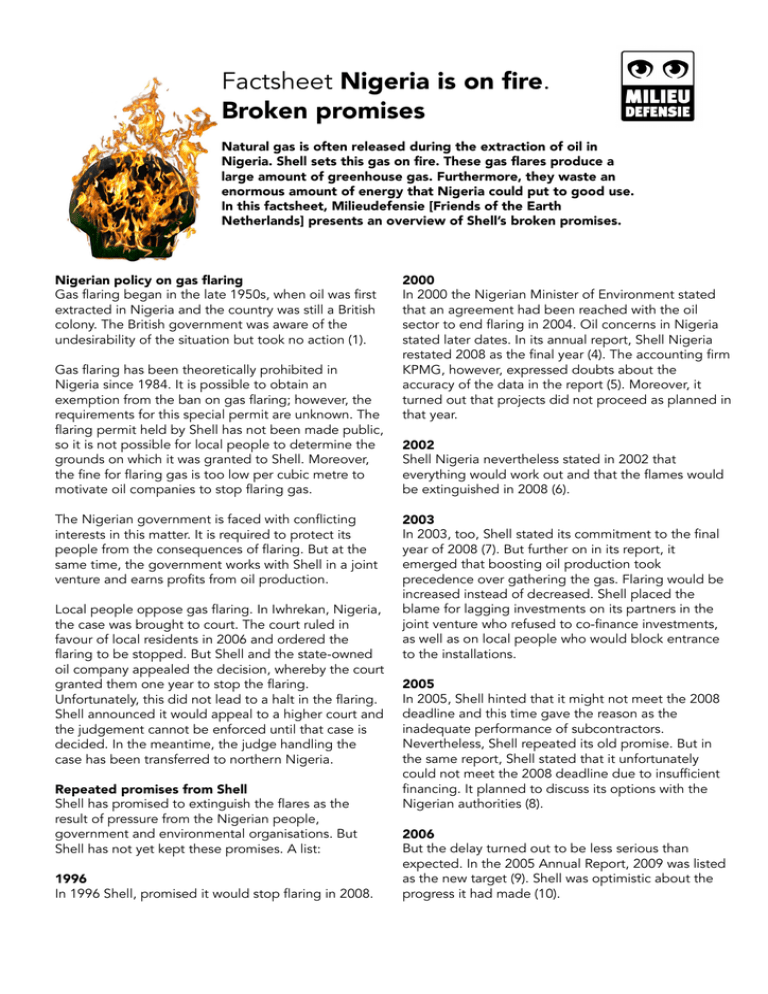
Factsheet Nigeria is on fire. Broken promises Natural gas is often released during the extraction of oil in Nigeria. Shell sets this gas on fire. These gas flares produce a large amount of greenhouse gas. Furthermore, they waste an enormous amount of energy that Nigeria could put to good use. In this factsheet, Milieudefensie [Friends of the Earth Netherlands] presents an overview of Shell’s broken promises. Nigerian policy on gas flaring Gas flaring began in the late 1950s, when oil was first extracted in Nigeria and the country was still a British colony. The British government was aware of the undesirability of the situation but took no action (1). Gas flaring has been theoretically prohibited in Nigeria since 1984. It is possible to obtain an exemption from the ban on gas flaring; however, the requirements for this special permit are unknown. The flaring permit held by Shell has not been made public, so it is not possible for local people to determine the grounds on which it was granted to Shell. Moreover, the fine for flaring gas is too low per cubic metre to motivate oil companies to stop flaring gas. The Nigerian government is faced with conflicting interests in this matter. It is required to protect its people from the consequences of flaring. But at the same time, the government works with Shell in a joint venture and earns profits from oil production. Local people oppose gas flaring. In Iwhrekan, Nigeria, the case was brought to court. The court ruled in favour of local residents in 2006 and ordered the flaring to be stopped. But Shell and the state-owned oil company appealed the decision, whereby the court granted them one year to stop the flaring. Unfortunately, this did not lead to a halt in the flaring. Shell announced it would appeal to a higher court and the judgement cannot be enforced until that case is decided. In the meantime, the judge handling the case has been transferred to northern Nigeria. Repeated promises from Shell Shell has promised to extinguish the flares as the result of pressure from the Nigerian people, government and environmental organisations. But Shell has not yet kept these promises. A list: 1996 In 1996 Shell, promised it would stop flaring in 2008. 2000 In 2000 the Nigerian Minister of Environment stated that an agreement had been reached with the oil sector to end flaring in 2004. Oil concerns in Nigeria stated later dates. In its annual report, Shell Nigeria restated 2008 as the final year (4). The accounting firm KPMG, however, expressed doubts about the accuracy of the data in the report (5). Moreover, it turned out that projects did not proceed as planned in that year. 2002 Shell Nigeria nevertheless stated in 2002 that everything would work out and that the flames would be extinguished in 2008 (6). 2003 In 2003, too, Shell stated its commitment to the final year of 2008 (7). But further on in its report, it emerged that boosting oil production took precedence over gathering the gas. Flaring would be increased instead of decreased. Shell placed the blame for lagging investments on its partners in the joint venture who refused to co-finance investments, as well as on local people who would block entrance to the installations. 2005 In 2005, Shell hinted that it might not meet the 2008 deadline and this time gave the reason as the inadequate performance of subcontractors. Nevertheless, Shell repeated its old promise. But in the same report, Shell stated that it unfortunately could not meet the 2008 deadline due to insufficient financing. It planned to discuss its options with the Nigerian authorities (8). 2006 But the delay turned out to be less serious than expected. In the 2005 Annual Report, 2009 was listed as the new target (9). Shell was optimistic about the progress it had made (10). 2007 In 2007, the promise to definitively stop flaring in 2009 was emphasised (11). 2009 In mid-2009, Shell Vice President of Communications Nick Wood stated that three billion dollars had been invested in gas gathering installations, but that at least three billion more needed to be invested (15). In other words, Shell was not even at the halfway point in its planned adaptations. The only way that the deadline could still be met was to shut off the oil flow to the gas flares. Shell stated that this was not possible because the Nigerian government had ordered oil production, and thus income from oil, to remain steady. The 2009 deadline was not met. 2010 Although the 2009 deadline was not met, gas flaring by Shell in Nigeria appears to have declined. Shell reported lower emissions in 2007 and 2008. According to Shell, flaring was reduced by 30 per cent between 2002 and 2008 due to its own measures such as exporting LNG (liquefied natural gas) and using gas in electric power plants. The main reason, however, is the result of closing down the oil flow in Ogoniland by government order. That occurred following large-scale local protests against Shell pollution (12). It is not clear whether all the problems really can be blamed on unrest in the region. It could also be that Shell is afraid that the government will actually hold the oil industry to its promise to stop the flaring. Given that in many locations Shell has not yet attended to gathering the gas, this would mean that the oil flow would have to be temporarily shut off. This is a message that Shell would rather not communicate to its shareholders. The ‘rebels’ are thus a convenient scapegoat. The government recently agreed a truce with the rebel groups. A large group of rebels in the Niger Delta recently took advantage of an amnesty ruling and surrendered their weapons. This has offered opportunities for a normalisation of the situation. It is feared that Shell plans to again open these sources as soon as possible, and thus to carry on with the flaring. Sources (1) The Climate Justice Programme / Friends of the Earth Nigeria 2005, Gas Flaring in Nigeria: A Human Rights, Environmental and Economic Monstrosity (2) Shell website 2009, interview with Jeroen van der Veer Jeroen van der Veer, former Shell CEO stated in 2008: ‘We are simply carrying on with the offshore company, the LNG installation and with investments in the Niger Delta as well. Gas flaring must be completely stopped there. We very much want to do this but it also must be made possible.’ (3) EIA 2005 country analysis brief Nigeria, www.eia.doe.gov/emeu/cabs/nigeria.html (4) SPDC (Shell Nigeria) 2001,People and the Environment Annual Report 2000; p. 1,38 ‘Flares out in 2008 on course. We remain committed to eliminating all unnecessary flaring of gas from our facilities by 2008. Good progress is being made towards achieving this target through the various projects in which we are involved to gather and put the gas currently flared to economic use.’ (5) KPMG 2001, Accountants report on 2000 Shell Nigeria Annual Report ‘Limitations exist in the completeness and quality of gas metering at the flow stations and these could affect the accuracy of the reported data for gas flaring.’ (6) SPDC (Shell Nigeria) 2003, People and the Environment Annual Report 2002 ‘Also, we flared approximately 10 per cent more gas than planned as a result of delays and slippage in a number of associated gas gathering projects. In addition, a number of factors including community disturbances, facilities shut downs and sabotage, contributed to our inability to effectively implement planned gas/oil ratio (GOR) controls in 2014.’ ‘We will make every effort to optimise project planning in order to ensure that the 2008 date for ending routine flaring is met.’ (7) SPDC (Shell Nigeria) 2004, People and the Environment Annual Report 2003 ‘Eliminating all routine flaring by 2008 is a major corporate commitment.’ ‘However, in 2003, the volume of associated gas (AG) flared was 700 million scf/d. This was more than the amount flared in 2002 (570 million scf/d), due partly to increased production and delay in commissioning the Offshore Gas Gathering System (OGGS).’ ‘(...) however, flowstation upgrades were behind plan due to budget pressure and some access problems to sites affected by community disturbances.’ (8) SPDC (Shell Nigeria) 2005 People and the Environment Annual Report 2004, Quote from Basil Omiyi, Managing Director ‘The second is the delay in fulfilling our commitment to end continuous gas flaring by 2008. Whilst past underfunding by partners is the main cause of this delay, some projects also suffered from poor contractor performance.’ ‘In 1996, SPDC made a commitment to end continuous flaring of associated gas by 2008 and, subsequently, the Nigerian Government also adopted this date as a flares-down target.(...)’ ‘Over the last five years, a significant investment (of over $2 billion) has been made by the joint venture to develop major associated gas gathering (AGG) projects to collect gas from our fields scattered across the Niger Delta (...)” ‘(...) This will leave 17 low production flowstations for which no firm and economically viable gas gathering solution has so far been determined. Further investigations are still required; if no viable solutions are found, we intend to shut in production from those fields during 2008.’ ‘We very much regret that we will not be able to meet the flares-down target of 2008 and we are discussing with the relevant Nigerian authorities the available options . The original flares-down target of 2008 was predicated on the joint venture’s programme being fully funded to deliver the required AGG projects. This was not achieved. For example, between 1996 and 2004 the budget approved by the Federal Government was in total some $4 billion less than that agreed by the partners as necessary to support the joint venture programme, including funding of the AGG projects .’ (9) SPDC (Shell Nigeria) 2006,People and the Environment Annual Report 2005 ‘But reduced funding of the joint venture programme in past years (including funding of the gas gathering projects) and poor contractor performance on some projects mean that some gas gathering projects will be completed only in 2009.’ ‘It is expected that a further $1.55 billion will be spent to meet the 2009 flares-down target.’ (10) Royal Dutch Shell, Annual Report 2005, p1 ‘In Nigeria, for example, we made good progress in the programme to end continuous flaring.’ (11) SPDC (Shell Nigeria) 2007,People and the Environment Annual Report 2006 ‘SPDC intends to shut in production from any fields where there is no prospect of a solution for gathering the associated gas by 2009.’ (12) Royal Dutch Shell, Annual Report 2008. ‘In 2007, total flaring in Exploration & Production dropped again. Nearly 80% of the drop in 2007 came in Nigeria, most of this from the closing down of production wells with a high gas content in the Niger Delta onshore, as a result of the security situation.’ Violence continued to block access to all remaining sites where gas-gathering equipment is needed in the Niger Delta, causing further delays in ending continuous flaring there. Flaring levels in Nigeria were the same as in 2007, as further progress with the programme to end continuous flaring was blocked by ongoing government funding and security problems.’ (13) Buitenhof [Dutch TV programme] 2009, interview with Jeroen van der Veer (14)www.bbc.co.uk/worldservice/africa/2009/08/090823_nigeri a.shtml (15) Shell 2009, Nick Wood, Vice President of Communications, Exploration and Production in official web chat: ‘Doing business in Nigeria: challenges and questions’, 23 July 2009 ‘The only other way of stopping flaring is by not producing oil in the first place. At a time when Nigeria’s oil production - and thus government revenue - is already badly hit by the ongoing violence, shutting-in production to reduce flaring would further cut revenues for social and infrastructure development.’ Milieudefensie, April 2010
